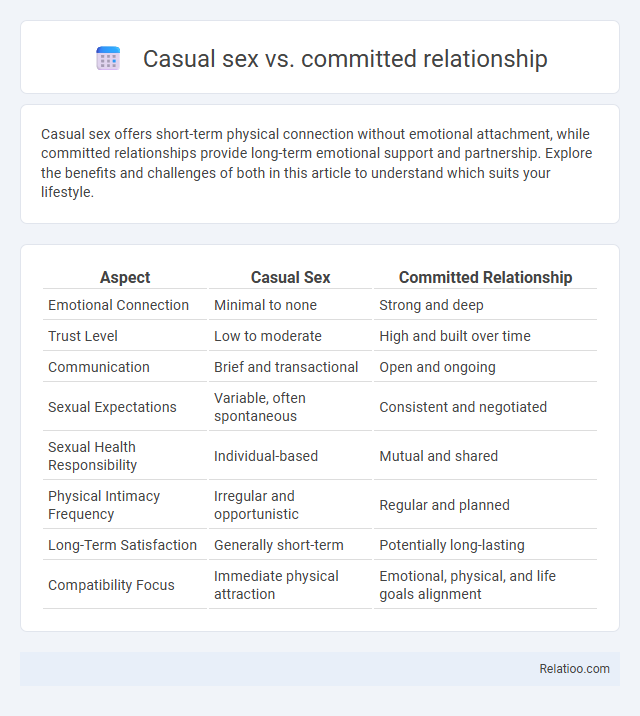Casual sex offers short-term physical connection without emotional attachment, while committed relationships provide long-term emotional support and partnership. Explore the benefits and challenges of both in this article to understand which suits your lifestyle.
Table of Comparison
| Aspect | Casual Sex | Committed Relationship |
|---|---|---|
| Emotional Connection | Minimal to none | Strong and deep |
| Trust Level | Low to moderate | High and built over time |
| Communication | Brief and transactional | Open and ongoing |
| Sexual Expectations | Variable, often spontaneous | Consistent and negotiated |
| Sexual Health Responsibility | Individual-based | Mutual and shared |
| Physical Intimacy Frequency | Irregular and opportunistic | Regular and planned |
| Long-Term Satisfaction | Generally short-term | Potentially long-lasting |
| Compatibility Focus | Immediate physical attraction | Emotional, physical, and life goals alignment |
Understanding Casual Sex: Definition and Context
Casual sex involves sexual activity without the expectations of a committed relationship, often emphasizing physical pleasure and short-term connection. Understanding casual sex requires recognizing its distinction from committed relationships, where emotional intimacy and long-term partnership are prioritized. Your awareness of these differences helps navigate potential emotional mismatches that arise when expectations between partners do not align.
What Constitutes a Committed Relationship?
A committed relationship is characterized by mutual exclusivity, emotional intimacy, and long-term dedication between partners, distinguishing it from casual sex, which often lacks these elements. It involves clear communication, shared goals, and a consistent effort to maintain trust and support, preventing emotional mismatch that can occur when partners have differing expectations. Understanding these components helps define commitment beyond physical connection, emphasizing emotional alignment and responsibility.
Emotional Implications of Casual Sex
Casual sex often leads to complex emotional implications, including feelings of detachment, confusion, or unmet emotional needs, contrasting with the emotional security found in committed relationships. Participants in casual encounters may experience emotional mismatch, where physical intimacy does not align with their deeper desire for connection, potentially resulting in feelings of loneliness or dissatisfaction. Understanding these emotional nuances is crucial for navigating personal boundaries and fostering healthy interpersonal dynamics.
Emotional Outcomes in Committed Relationships
Emotional outcomes in committed relationships often include increased feelings of security, trust, and deep emotional connection, which contrast with the typically transient emotional experiences in casual sex. Your emotional well-being tends to benefit from the stability and mutual support found in committed partnerships, whereas emotional mismatch can lead to frustration, loneliness, or distress despite involvement. Understanding these dynamics can help you foster healthier emotional experiences and choose relationships that align with your personal needs.
Physical Health Risks and Benefits
Casual sex often carries higher physical health risks such as increased exposure to sexually transmitted infections (STIs) due to multiple partners and inconsistent contraceptive use. Committed relationships generally provide benefits like reduced STI risk and more consistent sexual health practices, promoting overall physical well-being. Your emotional mismatch in any relationship can indirectly affect physical health by increasing stress, which weakens the immune system and heightens vulnerability to illness.
Impact on Mental Health and Wellbeing
Casual sex often leads to short-term gratification but can contribute to feelings of loneliness or emotional disconnection, affecting mental health negatively if lacking emotional support. Committed relationships typically promote emotional stability and increased wellbeing through consistent support and intimacy, though unresolved conflicts can lead to stress and anxiety. Emotional mismatch, where partners have differing expectations or needs, frequently results in confusion, frustration, and decreased psychological wellbeing, underscoring the importance of communication and emotional alignment.
Communication and Boundaries: Key Differences
Effective communication in casual sex focuses on clear, honest consent and the establishment of flexible boundaries to ensure mutual comfort without long-term expectations. In committed relationships, communication involves ongoing dialogue about emotional needs, future goals, and negotiation of boundaries that support trust, intimacy, and shared growth. Emotional mismatch often arises from misaligned communication styles or unspoken boundaries, leading to misunderstandings and dissatisfaction despite the presence of physical or emotional involvement.
Societal Views and Stigmas
Casual sex often faces societal stigmas rooted in traditional views of morality, portraying participants as irresponsible or lacking values, while committed relationships typically garner respect and validation as symbols of stability and maturity. Emotional mismatch challenges these perceptions by exposing the complexities beneath labels, where individuals in committed relationships may feel unfulfilled or those engaging in casual sex seek genuine connection despite societal judgments. Your understanding of these nuanced dynamics can help navigate social pressures and foster more compassionate attitudes towards diverse relationship experiences.
Navigating Consent and Mutual Expectations
Navigating consent and mutual expectations is crucial in casual sex, where clear communication about boundaries and intentions prevents misunderstandings and respects individual autonomy. In committed relationships, ongoing dialogues about emotional needs and desires ensure alignment and foster trust, reducing the risk of emotional mismatch. Addressing discrepancies in expectations early allows both partners to recalibrate consent and maintain a healthy dynamic, whether casual or committed.
Choosing What Suits Your Lifestyle and Values
Casual sex offers flexibility and freedom, appealing to those prioritizing personal exploration without long-term obligations. Committed relationships provide deeper emotional connection and stability, aligning with values centered on trust and shared growth. Understanding your emotional needs and lifestyle preferences helps you avoid mismatches, ensuring your choices support both mental well-being and authentic fulfillment.

Infographic: Casual sex vs Committed relationship
 relatioo.com
relatioo.com